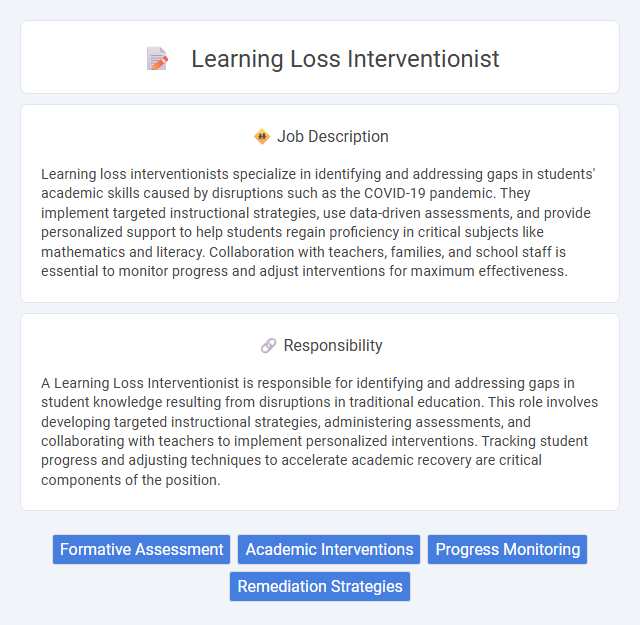
Learning loss interventionists specialize in identifying and addressing gaps in students' academic skills caused by disruptions such as the COVID-19 pandemic. They implement targeted instructional strategies, use data-driven assessments, and provide personalized support to help students regain proficiency in critical subjects like mathematics and literacy. Collaboration with teachers, families, and school staff is essential to monitor progress and adjust interventions for maximum effectiveness.
Individuals experiencing significant gaps in academic progress may be suitable for a Learning Loss Interventionist role if they possess strong patience and communication skills. Candidates with a background in education or experience working with diverse learners are more likely to effectively address varied learning needs. Those who struggle with adaptability or lack empathy might find this position challenging and less aligned with their strengths.
Qualification
A Learning Loss Interventionist must possess a Bachelor's degree in Education, Special Education, or a related field, with experience in tutoring or delivering targeted academic support. Strong knowledge of intervention strategies, data-driven instruction, and familiarity with educational technology tools is essential for effectively addressing learning gaps. Certifications in literacy or math interventions and excellent communication skills enhance the ability to collaborate with educators and monitor student progress.
Responsibility
A Learning Loss Interventionist is responsible for identifying and addressing gaps in student knowledge resulting from disruptions in traditional education. This role involves developing targeted instructional strategies, administering assessments, and collaborating with teachers to implement personalized interventions. Tracking student progress and adjusting techniques to accelerate academic recovery are critical components of the position.
Benefit
A Learning Loss Interventionist likely supports students in recovering critical academic skills that may have declined due to interruptions in learning, increasing the probability of improved academic performance. Focusing on targeted strategies, they may help reduce achievement gaps, thereby enhancing students' confidence and engagement in the classroom. Their role often contributes to creating a more equitable learning environment by addressing diverse educational needs.
Challenge
Learning loss interventionists likely face the challenge of addressing diverse student needs within limited time frames, making personalized support difficult. The probability of encountering varying levels of learning gaps may require adaptable strategies and quick assessment skills. Managing high caseloads could also hinder the effectiveness of interventions aimed at closing educational gaps.
Career Advancement
Learning loss interventionist roles provide crucial support in addressing gaps in student achievement, enhancing educational outcomes through targeted strategies. Professionals in this field gain expertise in data-driven instructional techniques, leading to opportunities in curriculum development, educational leadership, and specialized academic coaching. Career advancement is often marked by roles such as instructional coordinator, education consultant, or district-level supervisor, reflecting an increased responsibility for shaping effective learning interventions.
Key Terms
Formative Assessment
A Learning Loss Interventionist specializes in identifying and addressing gaps in student knowledge through targeted instructional strategies. Formative assessment techniques such as quizzes, observations, and student feedback enable real-time monitoring of progress and inform personalized intervention plans. Data-driven insights from these assessments ensure that learning loss is mitigated effectively, promoting academic recovery and growth.
Academic Interventions
Learning loss interventionists specialize in designing and implementing targeted academic interventions to address gaps in student achievement caused by disruptions such as school closures or remote learning. They utilize data-driven strategies and individualized instruction plans to accelerate skill development in core subjects like math and reading. Collaboration with teachers and families ensures sustained progress and supports students' return to grade-level performance.
Progress Monitoring
A Learning Loss Interventionist specializes in targeted support to address student gaps in knowledge and skills due to disruptions in education. Progress monitoring is essential in this role, involving frequent, data-driven assessments to track student improvement and adapt instructional strategies promptly. This continuous evaluation ensures personalized interventions effectively accelerate academic recovery and overall student achievement.
Remediation Strategies
Learning loss interventionists employ targeted remediation strategies such as personalized tutoring, formative assessments, and differentiated instruction to address gaps in student knowledge. They utilize data-driven techniques to identify specific learning deficits and implement tiered interventions that reinforce foundational skills in literacy and numeracy. Progress monitoring tools guide the continuous adjustment of teaching methods, ensuring measurable improvement in learner outcomes.
 kuljobs.com
kuljobs.com